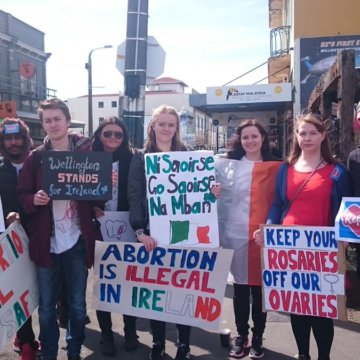- About
- Topics
- Picks
- Audio
- Story
- In-Depth
- Opinion
- News
- Donate
-
Signup for our newsletterOur Editors' Best Picks.Send
Read, Debate: Engage.
| located: | Ireland |
|---|---|
| editor: | Shira Jeczmien |
On an average day, every day of the year, approximately 10 Northern Irish women and young girls travel to England for access to abortion treatments. Until just a few months ago, the 30th of June 2017, this ‘privilege’ for choice and fair treatment also cost between £425 for the pill, to £1,395 for advanced pregnancy abortion, not including travel costs. Needless to say, England’s newly enacted law that covers the costs of abortion treatments and travel for Northern Ireland’s women is a milestone. But as long as the Republic of Ireland maintains one of the strictest abortion laws in Europe, the need to fight for women’s rights remains high on the agenda.
And so last Saturday, thousands took to the streets of Dublin in the annual Choice march. This time around, the peaceful protest carried on its back more resilience, and certainly more determination as Ireland’s recently elected Taoiseach (prime minister), Leo Varadkar, announced there will be a referendum on abortion laws in May or June 2018. With worried headlines reading “abortion referendum just before Pope’s visit in August”.
Although abortion hasn't always been illegal is the predominantly Catholic country, it was adopted into the constitution as an eighth amendment in 1983, affording women and an unborn child equal rights, with 67% of the population in support. This means that in Ireland, abortion is completely illegal unless the women’s health is under threat through complicated medical conditions or high risk of suicide. Much like its neighbouring Northern Ireland, the right to choice allowed to women and young girls in their most vulnerable state is their legal right to travel to England, at their own expense, of course.
To say Ireland is a repressive country with medieval laws and ideology wouldn’t be quite accurate. The country prides itself in offering referendums on frequent issues. It was the first country in the world to fully legalise same sex marriage through a referendum and has in June elected its first homosexual prime minister from an ethnic minority background and the youngest to ever lead the country. In 2015, Ireland also went from being one of the last countries in Europe to give trans people a means to change their legal gender, to one of just five countries in the world where a person can change their gender by simply filing a declaration. And it doesn't stop there, this year, medically supervised injection centres for heroin users opened, in conjunction, drug decriminalisation for personal use has remained high on the agenda.
How can a country that holds abortion as a crime worthy of up to 14 years imprisonment at the same time vote for same sex marriage, safe drug taking and even decriminalisation of substance use? Because this is not a question of Catholic morals, this is a question of women’s rights. As is evident, our modern society is willing to bend God’s wishes in every which way, except when it comes to women’s equality. And for that, we can never stop fighting.
Photo: Twitter
